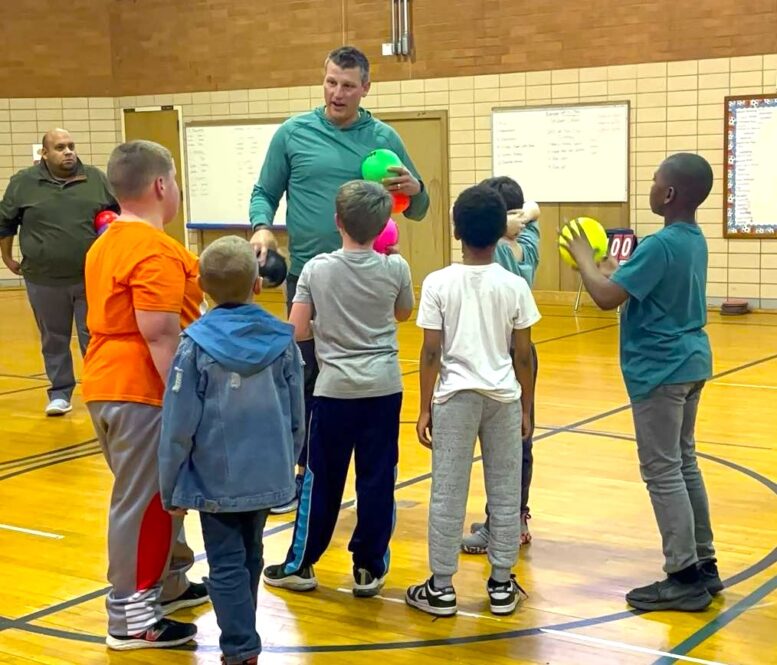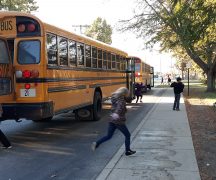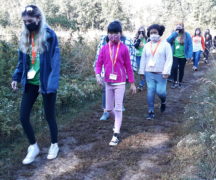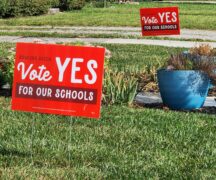By JULIE CARLE
BG Independent News
Three gym buddies stick firm to their motto, “Be Better, Suck Less” when it comes to their workouts.
Matt Karaffa, Tony Lake and Sam Beaver also have chosen the “Be Better” part of their motto to name the nonprofit foundation they founded together last fall. The Be Better Foundation is all about empowering youths in Bowling Green who may be facing adversity, and helping them to become more resilient, active and positive contributors to society.
The idea for the foundation came about one afternoon when Lake was at the Karaffa house listening to Matt’s wife, Alyssa, talk about her day as principal at Conneaut Elementary School. He had no idea of the challenges teachers and administrators dealt with daily due to factors, such as disruptive behaviors and diverse learning needs.
The more he learned, the more questions he had. For Alyssa, her role as an administrator was often more about disciplining, which didn’t leave as much time for mentoring.
“It was a good conversation with Matt and Alyssa,” Lake said. “Within our conversation, I stopped and said, ‘You know what they should do?’ When I said that, I immediately realized it wasn’t about what should they do, but it was about what we should do.”
As a local business owner of Almar Property Management and former member of the Bowling Green Youth Hockey Board and several other local boards, Lake has learned, “We all have the ability within ourselves if we look hard enough to figure out how we can help.”
Karaffa, vice president of business development with Risk Strategies, Lake, and Beaver, founder and owner of The Well Health and Fitness, didn’t waste any time once they decided it was up to them to do something to make a difference.
Thanks to their can-do attitude, in September, they talked about how to move forward, and by December, they had their nonprofit designation for the Be Better Foundation. “We’ve been rolling ever since,” Lake said.
In addition to the three men, the board includes members Brandy Best, Mark Cassin, Chad Hunt, Beth Mcintosh and Alyssa Karaffa, as the liaison between the foundation and the school.
Their solution, which they admit will adapt as needs change, is to connect local adults with students who can benefit from consistent, positive role models. Each mentor spends at least 30 minutes with their designated student each week during the school day. They might help with homework, play games or have one-on-one conversations, said Lake during a recent interview.
Since January, 10 boys at Conneaut, who are 8 to 11 years old, have been identified for the program. Each of them is paired with a male mentor “to be a male role model,” said Karaffa. “Someone to check in, ask questions, be curious about them.” The role of the mentor is to help bridge the gap between home and school, and be a consistent, stabilizing support for the students.
Currently, the program is only at Conneaut with boys. Karaffa said they hope to expand the program to other schools and then to girls with female role models at some point, but for now, they don’t want to grow too fast and not be able to meet the needs of the youths and maintain an important level of control over the program.
The team works with the principal and teachers to determine each student’s strengths and needs. For example, some boys respond best to reward-based incentives, others are focused on interests such as art or sports.
The principal identifies the students who will most benefit from the program. Then it becomes the foundation’s job to find suitable mentors with similar interests and hobbies. There is a formal intake form for the mentors. The BG City School District is diligent about running the background checks for the potential mentors. The pairings are decided by the principal, not by the foundation, nor the mentors.
Initially, there were 16 boys identified by the principal for the program, but that felt overwhelming for the start, Karaffa said. They whittled the list to 10.
With 10 boys and 10 mentors, managing the efforts “is pretty easy. It is sort of the beta test,” he said. “As it grows, it will be tougher to do, but it’s been really good for the start.”
One of the struggles is identifying mentors with whom they are comfortable. “We are putting our name on the program, so we want to make sure that we have people we know and who are able to break away from their job during the school day at least one day a week,” Karaffa said. “Consistency is key to our success.”
The goal is for the mentors to spend at least 30 minutes a week during the school day. It can be during lunch, recess or a free period for the student. Mentors are asked to stay with their students as long as needed, maybe even into and through high school.
The foundation members strive to make sure someone on the foundation board has direct ties to the potential mentors. They don’t even reference the “six degrees of separation” that is often a yardstick for connections.
“We are not doing auditions for volunteers,” Karaffa said. “We want that personal touch as we grow it. We want it to be as organic as possible.”
Once they find men who have the time and are interested, the “sell” is easy once they see how the boys respond.
The first mini event was held after school and included several mentors with a group of the boys. The first half of the gathering was talking about each kid’s superpower and identifying what they wanted to work on in the next few weeks, such as listening, patience and kindness. The second half was playing games such as basketball and floor hockey.
“It was just hanging out and playing, because that’s what kids do,” said Beaver. Yet the feedback from the teachers was that the boys couldn’t stop talking about the fun they had. “We never get to do stuff like that,” they told the teachers.
“To me, that is such a foundational part of being a kid, of just hanging around and playing games,” Beaver said. “But to them, it was something they never really got to experience. That’s when it kind of sunk in on me that we have something special here, and we’re filling a gap.”
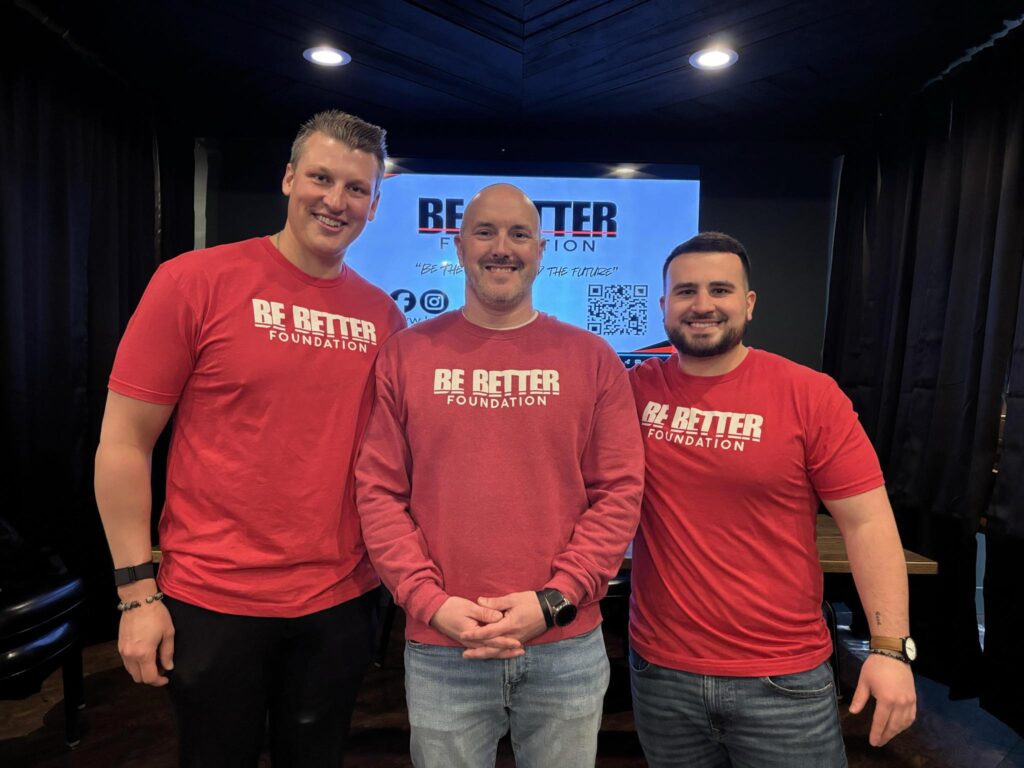
The group went into the inaugural mini event with zero expectations, Beaver said. “We left with more ideas and more of a structure on how to form the events and make an annual plan to focus on different aspects moving forward.”
“We are moving way faster than I thought we would,” Lake said, “though we’re probably not moving fast enough for Matt, who is ready to go, and how we started it so quickly.”
Mentor recruitment is high on the list for their summer tasks. They want to have five to 10 more mentors with new kids and maybe five to 10 at another school by fall.
Another goal over the summer is to increase awareness, not only of the foundation, but of the need in Bowling Green.
“When we tell people about the statistics of how many students are eligible for free or reduced lunch, they don’t believe that happens in Bowling Green, yet it does,” Karaffa said. “There is a need and this is how we’re helping.”
The foundation has done some fundraisers by selling merchandise and seeking sponsorships. They sold Be Better Foundation shirts to get their name more recognized and they are currently selling an activity book called “Be Better: A Guide to Becoming Your Best Self.” The book, built to help first through fifth graders grow in kindness, confidence and character, is 65 pages filled with coloring pages, interactive activities and inspiring messages.
All proceeds from the book sales will go toward advancing the foundation’s mission. The book is available at https://bit.ly/BeBetterbook
The foundation, the mentors and the work they are achieving is becoming more visible. Beaver has noticed how the students are becoming more aware of what it means to be involved in Be Better. “When I walked into the classroom last week, everyone in the classroom said ‘Hi, Sam,’ and they are kids I’ve never met before.”
To him that means the message is getting shared organically.
“I think the kids are recognizing what’s happening. No one’s embarrassed. It’s all very uplifting,” Beaver said.
And some of the students are asking, “When do I get one of those guys,” Karaffa said. “We are changing the script.”
Eventually, the hope is that the students who are first to benefit from the mentorship will go on to lead and become mentors themselves.
Lake created a phone app for mentors to use that helps document the successes as a way to gather data to show how the program is helping. It is still early in the process, but the principal, teachers and other staff are noticing some changes.
Karaffa’s student is incentivized by rewards, so he has been earning “smileys” to receive a reward. With a little encouragement, he’s been able to “knock it out” by the end of the week. Last semester, he was referred to the office 12 times. So far this semester, it’s been less than three times since December.
“You stack the days on the weeks, and now he’s having amazing weeks and not just days,” he said. “It’s good, because you don’t know what is going on with him when he leaves school. Maybe he’s not sleeping. Maybe he’s taking care of a brother or sister. You have no idea.”
So they focus on what they can in the time they have, in order to make an impact, Karaffa said.
For Lake, he’s gained a whole new appreciation for teachers and school administrators. But he’s also gained a new perspective on the students who are recommended for the program. They may be challenging at times, but once you get to know them, they are great kids.
“We have bigger plans for the program to go beyond 30 minutes in school. We want to be able to impact these kids and nudge them in a different direction,” Lake said. “We are looking to the next generation of leaders in our community and beyond.”
For more information, Be Better Foundation has a Facebook page and a website for donations and sponsorships.

